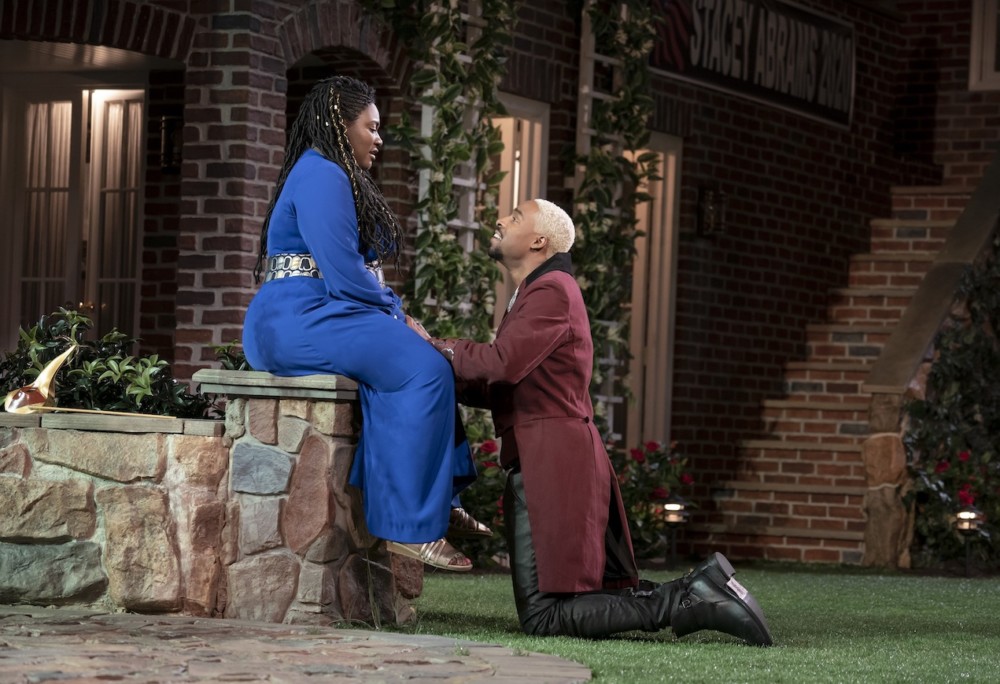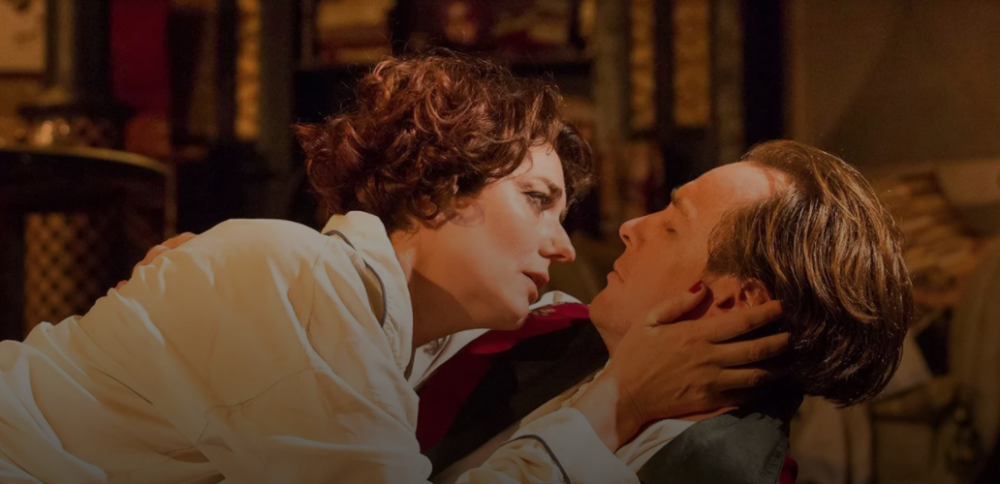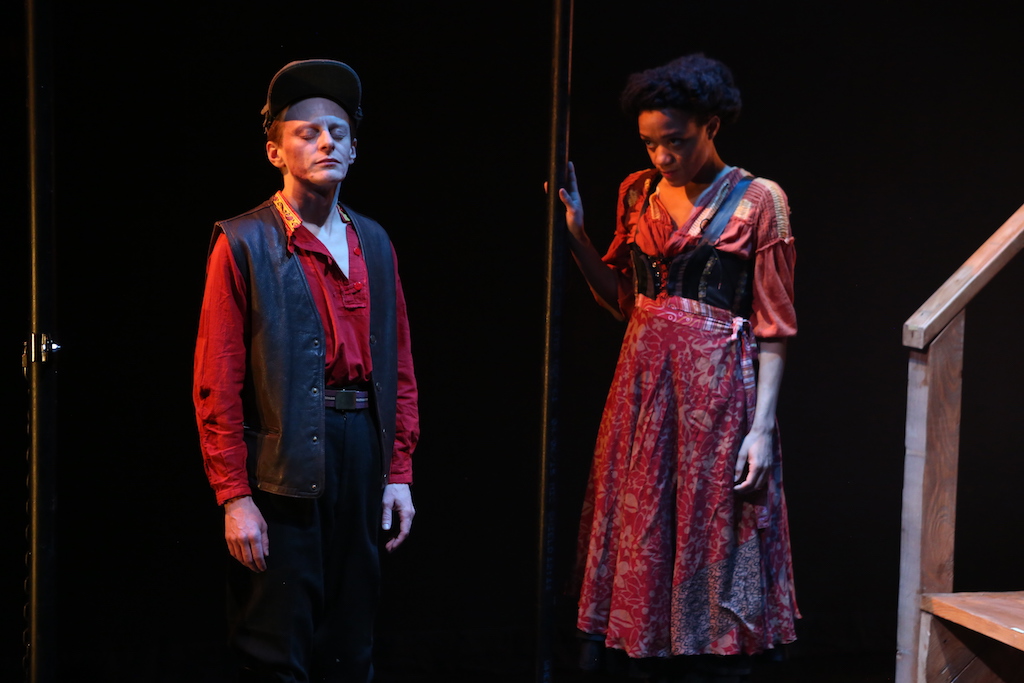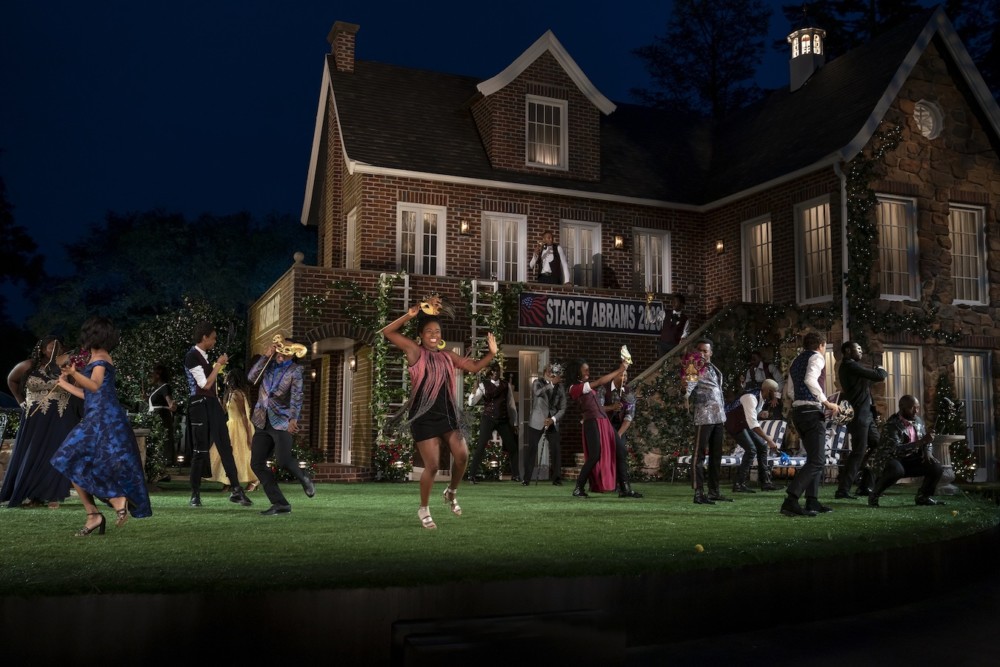
By JK Clarke
As unorthodox as it may be to begin a review of a Shakespeare play with such a claim, the fact is you’ll probably never see better dancing in a Shakespeare play than in the Public Theater’s current production of Much Ado About Nothing at the Delacorte Theatre in the summer of 2019’s glorious first Shakespeare in the Park. While the Bard’s works are not generally noted for their fancy footwork, Camille A. Brown’s choreography is unmatchable, and just one of many terrific pieces of this enchanting and thought-provoking play, such that it is, can almost fade into the background, despite its significance.
Much Ado About Nothing is a lighthearted and fiery love story set in a time of war. In this contemporary production directed by Tony Award winner Kenny Leon (A Raisin in the Sun), the cast, as is widely noted in media accounts, is “all black.” While that’s true, it’s more important to note that this is an African-American production. Moved from Don Pedro’s original home of “Aragon,” the setting here is in the not too distant future in Aragon, Georgia, on a modern, brick, southern estate (set by Beowulf Boritt). Two banners endorsing “Stacey Abrams, 2020” (for the upcoming presidential campaign) take up much of the home’s façade.
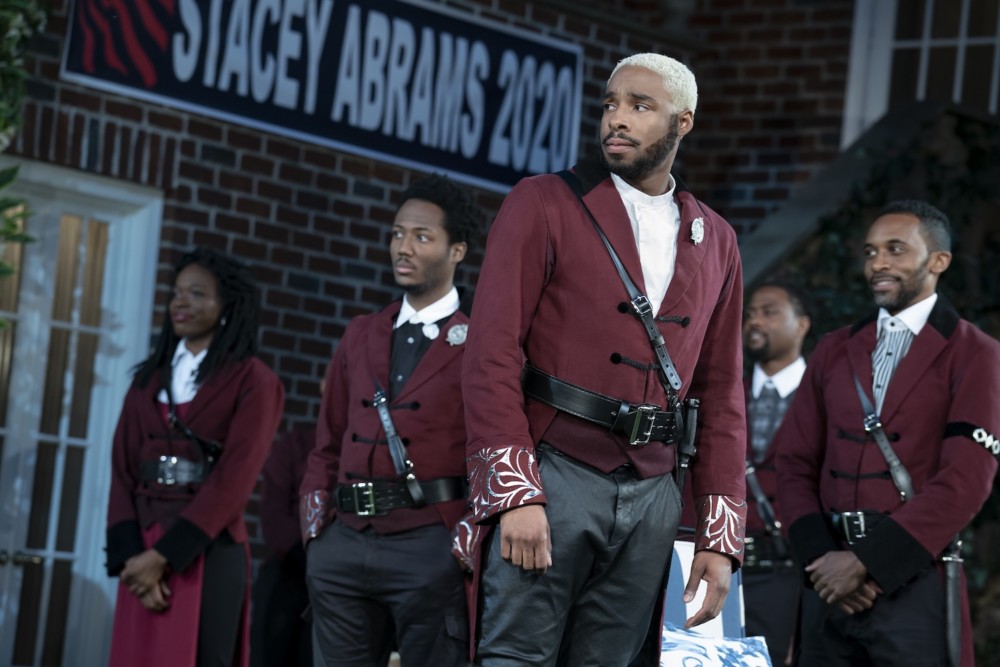

Grantham Coleman
At the play’s open, men sporting stylish military uniforms (costumes by Emilio Sosa) with large holstered daggers are returning from battle, followed by an assembly of citizens carrying banners proclaiming, “Restore Democracy Now,” “Hate is Not a Family Value,” while a medley of Marvin Gaye’s “What’s Going On?” (“Mother, mother . . . War is not the answer . . .”) and “America the Beautiful,” in gospel style similar to that of Ray Charles, is beautifully sung by various cast members. To be sure, it sets a very specific tone, one that allows the audience to glimpse the complexities of a society that is on the verge of falling apart over reasons that seem on the surface to be simplistic. Then the play as we know it, and as scripted by Shakespeare, begins.
The central players, Benedick (a charming Grantham Coleman) and Beatrice (the supremely talented Danielle Brooks) have a contentious and aggressive relationship, sniping at one another with witty, biting barbs. But friends and family believe they see through the veneer of these two, knowing them to be secretly deeply in love, though loathe to admit it. Meanwhile, Benedick’s dear friend Claudio (Jeremie Harris) whom he hopes will remain a committed bachelor and pal, falls hopelessly for Hero (Margaret Odette), Beatrice’s cousin, who giddily reciprocates his affections. Claudio, as well as Hero’s father, Leonato, Governor of Messina (Chuck Cooper, delightful and stately as ever), and friends, decide to trick Benedick and Beatrice into falling completely and openly in love. Naturally there’s a hitch, since it wouldn’t be a Shakespearean comedy without one. Don John (Hubert Point-Du Jour), the bitter brother of Don Pedro (Billy Eugene Jones), Aragon’s Prince, decides to throw a wrench in the works by making it look as if Hero is both unfaithful and unchaste. This subplot, which belies a cruel, misogynist backbone to the play, is often muted, and in this production the elements are there, but emphasis is tempered.
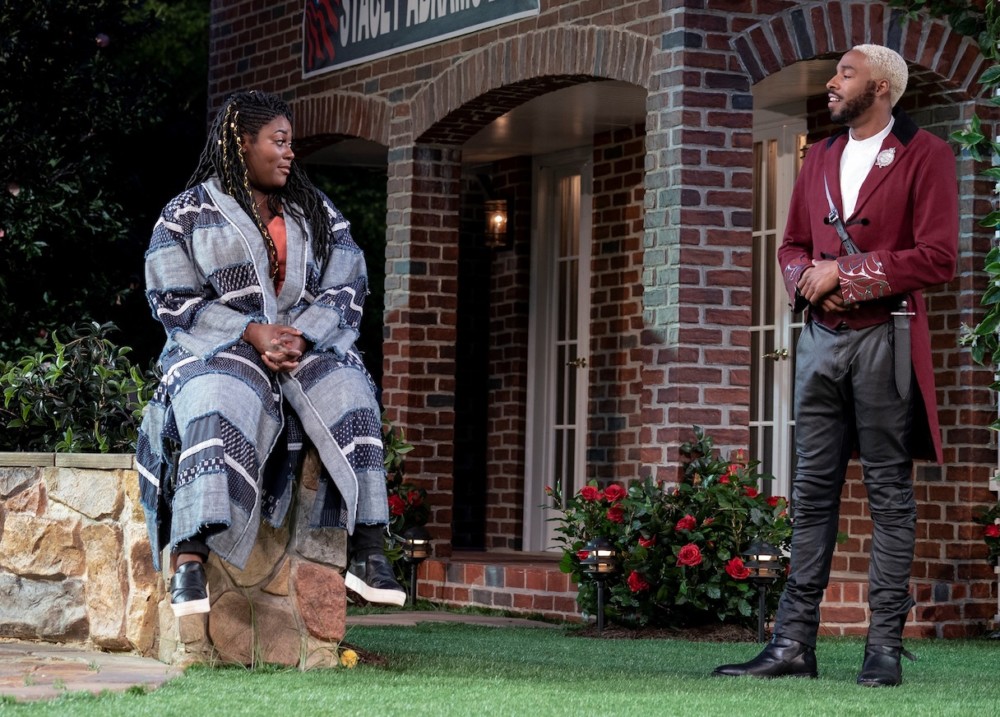

Danielle Brooks, Grantham Coleman
While modern settings often add complications to Shakespeare plays, particularly in terms of language and message, this Much Ado couldn’t resonate more clearly. Most importantly, Shakespeare’s language rings out from the actors, in a feat of both acting (Kate Wilson, responsible for Voice and Text) and sound engineering (Jessica Paz). Not only does one not miss a word, but the nuance and flow comes across perfectly natural and modern. Even when words like “heart” are given an extremely contemporary and colloquial re-pronunciation (“houart,” as Benedick suavely intones) the dialog is exemplary.
Another component of Much Ado, by which productions are measured, is the quality of the comic counterweight to the nobles at the center of the play: Constable Dogberry and her minions. Dogberry (played by Lateefah Holder) is responsible—along with deputy Verges (Erik Laray Harvey, unrecognizable from his cruel character, Dunn Purnsley, on HBO’s Boardwalk Empire) and the bumbling, vaudevillian, b-boy esque Watchmen—for maintaining order in the region. Her speech is non-stop, riotously funny malaprop. She knows big words, but never succeeds even once in using them correctly (sound familiar?). This Dogberry may be simple, but Holder makes her equal parts ferocious and feminine. She may insist you “write her down an ass” as the famous exchange goes, but she’ll also shake and strut her own, twerking as she goes.
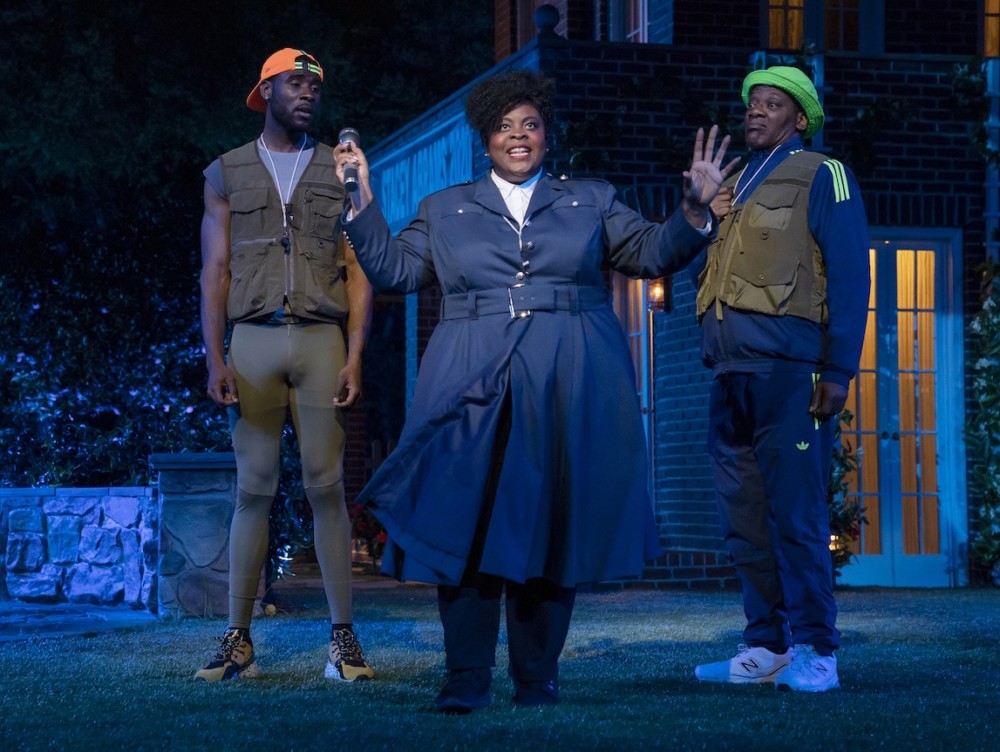

Denzel DeAngelo Fields, Lateefah Holder, Erik Laray Harvey
There are countless components of the play beautifully delivered, but what ties it together is the sheer joy with which the company performs. It’s most evident in the shattering of the fourth wall (which seems to be a mainstay of Shakespeare in the Park productions of late, which makes sense, as it is a community event). When Beatrice, hiding from her friends, not only somersaults into the audience, but goes so far as sitting in an audience member’s seat, perching the woman on her lap and hiding behind a Playbill, the audience explodes with laughter. Even better, on the night I attended, the woman’s friend in the next seat was a critic, sitting with her reporter’s notebook in her lap. Ms. Brooks deftly paid no mind (though it could’ve made for a funny bit), but I can only imagine the writer’s anxiety.
The remarkable thing about this modern take on a play written in 1598 is the very reason why Shakespeare remains so relevant: despite changes in clothes, music, dance, styles and even, to a degree, attitudes, the message of Much Ado About Nothing remains exactly the same: in these times of war (in the case of this production it’s socio-political civil strife), to borrow from one of the protest signs that trails off stage at the play’s end, “Now More Than Ever We Must Love.”
Much Ado About Nothing. Through June 23 at The Delacorte Theater in Central Park (in the park at Central Park West and 81st Street). Two hours, 20 minutes with a 20 minute intermission. www.publictheater.org
Photos: Joan Marcus


